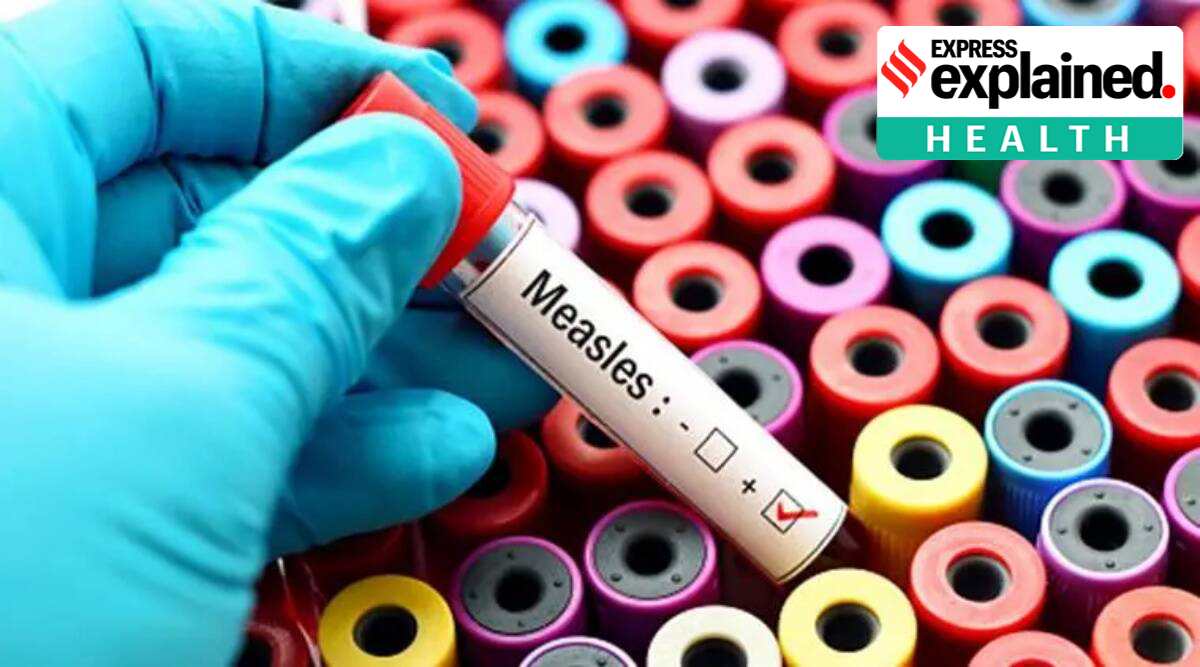Measles outbreak in Mumbai: Here is all you need to know about the disease - The Indian Express

Mumbai is currently witnessing an outbreak of measles. Between September and October, a total of 84 cases of measles have been reported in the city. Most of them are from the M-East ward that covers Govandi.
Last month, three children — Hasnain (5), Noorain (3.5) and Fazal khan (13 months), residents of Rafi Nagar, Govandi, lost their lives in a span of 48 hours. Now, the Brihanmumbai Municipal Corporation (BMC) is conducting door-to-door surveillance to identify suspected cases of the disease among children. Here's all you need to know about measles.
link="https://indianexpres.scom/section/explained/” hlabel="Best of Explained" hlink="https://indianexpress.com/section/explained/" pid="6372640″ mlabel="Click here for more" mlink="https://indianexpress.com/about/express-explained/"%5D
What is measles?
Measles or as it is called 'khasra', is a highly contagious viral disease which affects mostly children. It is one of the leading causes of death and disability among young children. There is no specific treatment for measles but there is a vaccine to stay protected from the disease, which is both safe as well as cost effective.
Subscriber Only Stories
"Measles spreads by coughing and sneezing, close personal contact or direct contact with infected nasal or throat secretions. So, isolation of these infected children is essential," said Dr Mangala Gomare, executive health officer.
Death due to measles are caused by the complications associated with the disease like blindness, encephalitis, severe diarrhoea and pneumonia. "The condition of an infected child turns severe in cases of poor nourishment, Vitamin A deficiency and if the child is immunocompromised," said Dr Gautam Bhansali, consultant physician at Bombay hospital.
How long can an infected patient spread measles?
As per reports, an infected child with measles can spread the virus to others for about eight days, starting four days before the rash appears and ending when the rash has been present for four days.
What are the symptoms?
Advertisement
Symptoms appear around 10 to 14 days after exposure to the virus. The main symptoms are fever, dry cough, running nose, sore throat and rash. Explaining the symptoms, Dr Gomare said, "The rashes look like small red spots which remain slightly raised and give the skin a splotchy red appearance. The face of the rash breaks out first. Within days, it spreads to the rest of the body."
Doctors have cautioned parents to immediately contact doctors if their children show symptoms. Any delay in the detection of the infection may deteriorate the condition of the child.
How important is it to take measles vaccines?
Young children, who don't receive measles immunization, are at highest risks of being exposed to measles and its complications, including death. The WHO recommends immunization for all children with two doses of measles vaccine, either alone, or in a measles-rubella (MR) or measles-mumps-rubella (MMR) combination. As per the guidance of National Health Mission, in India, measles vaccination is given under the Universal Immunisation Programme at 9-12 months of age and the second dose at 16-24 months of age.
Advertisement
Dr Ajit Gajendragadkar, Consultant, Paediatrics, P D Hinduja Hospital said, "Children who are not vaccinated are at a high risk of contracting the disease, which in some cases can be fatal or cause significant morbidity."
Reason behind high vaccine hesitancy in the slums of Mumbai
The healthcare workers expressed that vaccination in the slums, especially in Govandi — one of the peripheral areas and located close to the Deonar dumping ground — is an uphill task due to vaccine hesitancy and negligence. Fatima Ahmed Khan, an ASHA worker, said that most of the population in the slum are migrants who report multiple births. As informed, the deceased Hasnain and Noorain were the eight and ninth children and their mother, Sherunisha Khan, is pregnant with the tenth child. "Even after a lot of persuasion, they don't let their children get vaccinated. Due to repeated pregnancies, the mothers also fall sick whose priority changes into feeding so many children rather than vaccination," she said.
Apnalaya, an NGO that works closely with the BMC in Govandi, also talked about challenges in dealing with the reluctance towards vaccination from the community. "However, it is important to understand the reasons for this reluctance and the context of the living conditions in the area. This suspected outbreak calls for deeper engagement with the community on the importance of vaccines," said Praveen Singh, CEO, Apnalaya.
Comments
Post a Comment